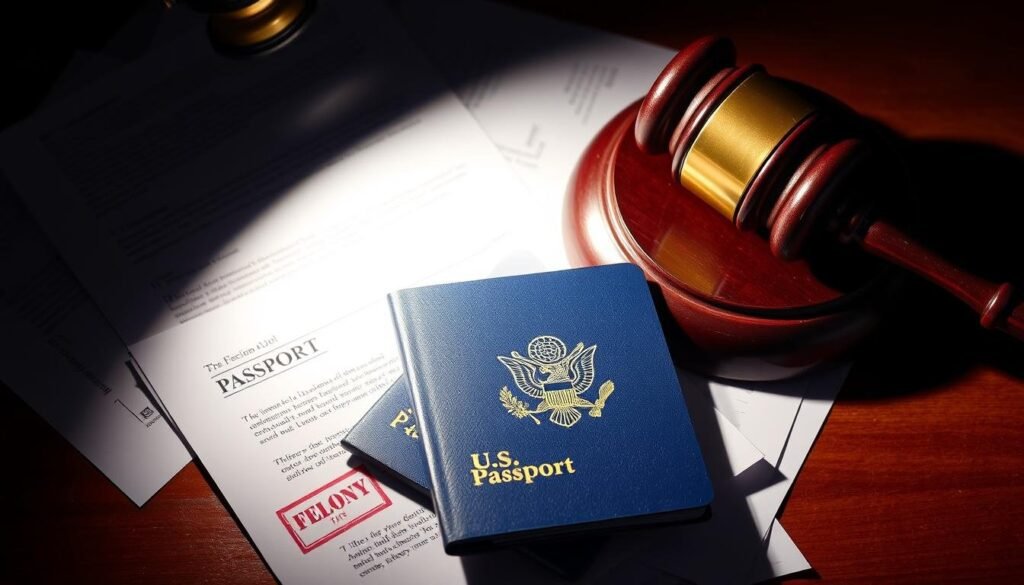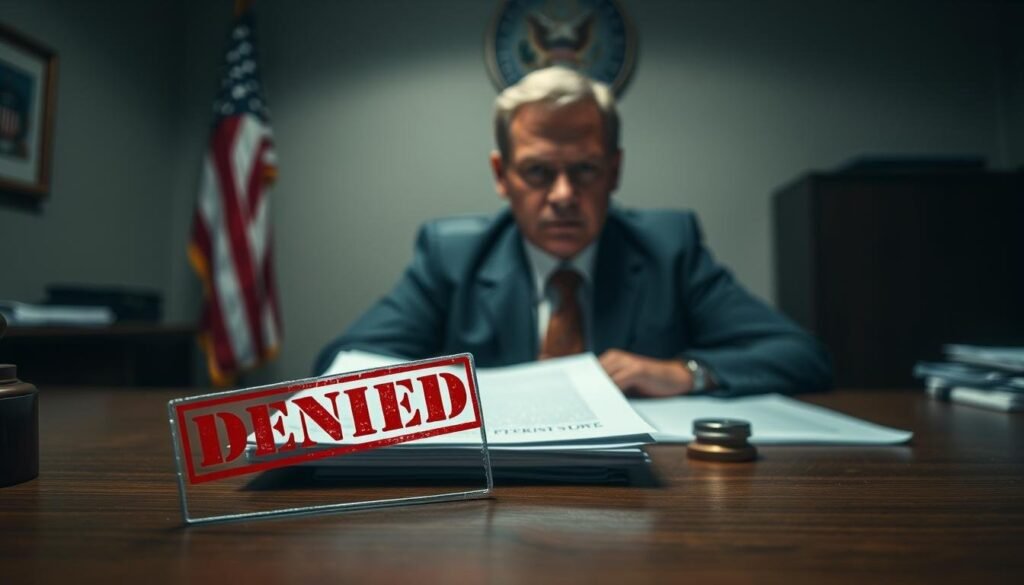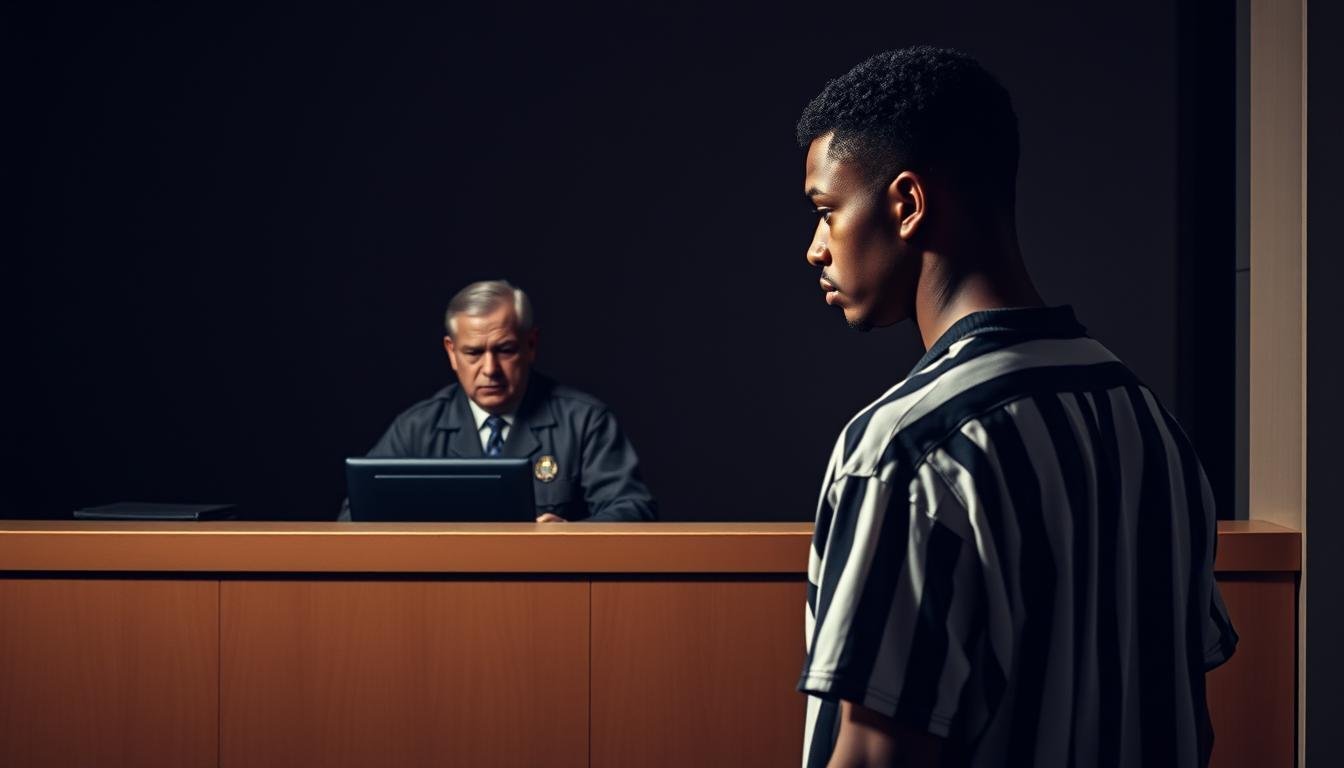Can a Felon Get a US Passport? Many people with felony convictions wonder if they can get a US passport. You’re not alone in this question. It’s common for those with felonies to be unsure about their passport eligibility.
Felon passport eligibility depends on certain criteria. Knowing these criteria is key to a successful US passport application process.
Getting a US passport can be tricky, especially with a felony conviction. But, having a felony doesn’t mean you can’t get a passport. It’s not a total block. [Can a Felon Get a US Passport?]
To make it through the process, you need to know the rules for felon passport eligibility. You also need to understand what documents are needed for a US passport application.
Contents
- 1 Understanding US Passport Eligibility Basics
- 2 Can a Felon Get a US Passport? The Short Answer
- 3 Types of Felonies That Automatically Disqualify You
- 4 Felonies That May Affect Your Passport Application
- 5 The Passport Application Process for Felons
- 6 Passport Books vs. Passport Cards for Felons
- 7 Timing Considerations: When to Apply After a Conviction
- 8 Passport Denials: Common Reasons and Next Steps
- 9 The Appeals Process for Denied Applications
- 10 International Travel Restrictions for Felons With Passports
- 11 Restoring Your Rights: Expungement and Pardons
- 12 Conclusion: Can a Felon Get a US Passport?
- 13 FAQ
- 13.1 Can I get a US passport if I have a felony conviction?
- 13.2 What types of felonies can prevent me from getting a US passport?
- 13.3 How do I know if my felony conviction will affect my passport application?
- 13.4 Can I apply for a US passport while I’m on probation or parole?
- 13.5 What’s the difference between a passport book and a passport card, and which is better for me?
- 13.6 How long do I have to wait after a felony conviction before applying for a US passport?
- 13.7 What if my passport application is denied – can I appeal the decision?
- 13.8 Can I travel internationally with a felony conviction if I have a valid US passport?
- 13.9 Will expunging or pardoning my felony conviction help me get a US passport?
Understanding US Passport Eligibility Basics
Knowing the basics of US passport eligibility is key, especially for those with a felony conviction. To see if you can get a US passport, you need to understand the rules.
The US Department of State gives out passports to citizens who meet certain criteria. You must be a US citizen, show proof of who you are, and pay the fees. But, a felony conviction can affect your eligibility.
- You must be a US citizen, either by birth or naturalization.
- You need to provide proof of identity, such as a driver’s license or birth certificate.
- A felony conviction may not automatically disqualify you, but it can complicate the process.
The impact of a felony conviction on your passport application depends on several factors. These include the type of felony and any outstanding warrants or court orders.
Can a Felon Get a US Passport? The Short Answer
Having a felony conviction doesn’t mean you can’t get a US passport. The US Department of State decides who can get a passport. Some felony convictions might affect your application, but not all.
The short answer is: it depends on the type of felony and the circumstances surrounding your conviction. If you’re a felon, your passport application will be looked at individually. The Department of State will consider the crime, when you were convicted, and if you’ve finished your sentence.
Crimes like drug trafficking or those involving international travel might be more of a concern. Also, if you’re on probation, parole, or have an outstanding warrant, your application could be denied.
To boost your chances of getting a US passport as a felon, knowing what affects your eligibility is key. Make sure you have all the right documents and be open about your conviction.
Types of Felonies That Automatically Disqualify You
Certain felony convictions can stop you from getting a US passport. Knowing these convictions is key to figuring out if you can get a passport. [Can a Felon Get a US Passport?]
Drug trafficking felonies are a big no-no. The US government is very strict about drug trafficking. It’s seen as a big threat to national and international security.
Specific Laws and Regulations Regarding Drug Trafficking
The Anti-Drug Abuse Act of 1986 and laws after it make it clear. If you’ve been convicted of drug trafficking, you can’t get a passport. This is part of a bigger fight against drug trafficking worldwide.
Here’s a quick look at how different felonies affect your passport application:
| Felony Type | Impact on Passport Application | Relevant Law |
|---|---|---|
| Drug Trafficking | Automatic Disqualification | Anti-Drug Abuse Act of 1986 |
| Treason or Espionage | Automatic Disqualification | 18 U.S.C. § 2381, 18 U.S.C. § 793 |
| Other Felonies | Case-by-Case Evaluation | Various Federal Laws |
If you have a felony and want a US passport, you need to know the laws. Talking to a lawyer can help you understand your chances and what to do next.
Felonies That May Affect Your Passport Application
The type of felony you’ve been convicted of is key in passport eligibility. Some crimes affect your application more than others.
When you apply for a US passport, the Department of State checks your application. They look at your criminal history among other things.
- Drug trafficking convictions can raise concerns and may lead to additional scrutiny.
- Crimes involving international borders, such as smuggling or human trafficking, can impact your eligibility.
- Financial crimes, like money laundering or large-scale fraud, may also affect your application.
These felonies don’t mean you’ll automatically be denied a passport. But, they might make your application get a closer look.

To boost your chances of getting a passport, give accurate and detailed info about your conviction.
Important factors include the crime’s severity, when you were convicted, and any efforts to rehabilitate.
Knowing how different felonies can affect your passport application helps. It prepares you for any challenges you might face.
The Passport Application Process for Felons
If you’re a felon wanting a US passport, knowing the application steps is key. The process has several steps that need careful preparation and detail.
Step 1: Gather Required Documents. You’ll need to show proof of US citizenship, like a birth certificate or naturalization certificate. Also, a valid photo ID is required.
Step 2: Fill Out the Application Form. You must complete Form DS-11. You can download it from the US Department of State’s website or get it from a passport acceptance facility.
Step 3: Get a Passport Photo. You’ll need a recent, color photo that meets the Department of State’s standards. [Can a Felon Get a US Passport?]
The table below shows the documents and fees needed for the US passport application:
| Document | Description | Fee |
|---|---|---|
| Form DS-11 | Application for a US Passport | $0 (free download) |
| Proof of Citizenship | Birth Certificate or Naturalization Certificate | Varies |
| Photo Identification | Valid Driver’s License or Government ID | Varies |
| Passport Photo | Recent, Color Photograph | $10-$15 |
| Application Fee | Execution Fee + Application Fee | $35 + $110 (for adults) |
By following these steps and having all the right documents, you can successfully apply for a US passport as a felon.
Passport Books vs. Passport Cards for Felons
As a felon, you have two main choices for a US travel document: a passport book or a passport card. It’s important to know the differences to pick the right one for your travel needs.
A passport book is the traditional travel document. It’s used for international travel by air, land, or sea. It has many pages for visa stamps, making it great for frequent travelers or those visiting countries that need visas.
A passport card, on the other hand, is a wallet-sized document. It’s less expensive and can be used for land and sea travel to Canada, Mexico, the Caribbean, and Bermuda. It’s perfect for those who often travel by car or boat.
For felons, choosing between these documents depends on their travel plans and restrictions. If you plan to travel internationally by air, you need a passport book. But if you mostly travel by land or sea to nearby countries, a passport card might be enough.
Timing Considerations: When to Apply After a Conviction
If you’ve been convicted of a felony, it’s key to know when to apply for a US passport. The timing depends on the type of felony and your sentence status. [Can a Felon Get a US Passport?]
Understanding Waiting Periods
There’s no set waiting time to apply for a passport after a felony. But, the type of conviction can affect your eligibility. For example, some convictions might stop you from getting a passport.
| Conviction Type | Potential Impact on Passport Application |
|---|---|
| Drug Trafficking | Possible denial due to federal laws restricting travel for drug-related offenses |
| Child Support Cases | Owed $2,500 or more in child support? Your application could be denied |
| Felony with Court-Ordered Travel Restriction | Passport application likely to be denied until the restriction is lifted |
Remember, while there’s no one-size-fits-all waiting period, application processing times can vary. A complete and accurate application can speed up the process.
Before you apply, check your specific situation. You might want to talk to a lawyer to understand how your conviction affects your travel plans.
Passport Denials: Common Reasons and Next Steps
The US Department of State may deny a passport for several reasons. This includes felony convictions. If you’re a felon, knowing these reasons is key to figuring out if you can get a passport.
Passport denials often happen for felony crimes like drug trafficking, international child abduction, and treason. Also, if there’s a court order or federal warrant against you, your application might be turned down.

If your passport application is denied, you can appeal the decision. First, you need to know why it was denied. The Department of State will tell you the reason. [Can a Felon Get a US Passport?]
To appeal, you’ll need to send more information or documents. This could be proof of rehabilitation, court documents showing your case is closed, or other important evidence.
- Review the denial letter carefully to understand the reason for the denial.
- Gather required documentation to support your appeal.
- Submit your appeal according to the instructions provided by the Department of State.
By knowing the common passport denial reasons and how to appeal a passport denial, you can better handle the process. This might help you get the passport you need for traveling abroad.
The Appeals Process for Denied Applications
A denied passport application doesn’t mean it’s over. You can appeal the decision. The appeals process has several steps that need careful preparation and detail.
To start the appeals process, you must know why your application was denied. The denial letter from the passport agency will explain the reasons and tell you how to appeal.
Steps to Appeal a Denied Passport Application:
- Review the denial letter and understand the grounds for denial.
- Gather required documentation to support your appeal.
- Submit your appeal in writing, following the instructions provided.
Here is a summary of the key documentation and timelines involved in the appeals process:
| Documentation Required | Timeline | Description |
|---|---|---|
| Appeal letter | Within 60 days of denial | A written statement explaining why you believe the denial was incorrect. |
| Supporting documents | Varies | Documents that support your claim, such as court records or proof of identity. |
| Passport application | At the time of appeal | A completed passport application form. |
By understanding the appeals process and preparing your case carefully, you can successfully appeal a denied passport application. [Can a Felon Get a US Passport?]
International Travel Restrictions for Felons With Passports
If you’re a felon with a US passport, knowing about travel limits is key. A passport lets you travel abroad, but some countries have strict rules for felons.
Countries with Strict Entry Requirements
- Canada: Known for its strict entry policies, Canada may deny entry to individuals with felony convictions.
- Australia: Felons may face difficulties entering Australia due to its strict visa policies.
- Japan: Japan has a rigorous entry process and may refuse entry to individuals with a criminal record.
Before planning your trip, research the specific entry requirements for your destination. Some countries may require you to disclose your criminal history, while others may not.

- Probation or Parole: If you’re on probation or parole, you may need permission from your supervising officer to travel internationally.
- Passport Validity: Ensure your passport is valid for at least six months beyond your planned departure date from the country you’re visiting.
Understanding these restrictions and requirements can help you navigate international travel as a felon. Always verify the latest entry requirements and regulations before your trip to avoid any complications.
Restoring Your Rights: Expungement and Pardons
Getting your rights back after a felony conviction can be tough. You need to know about expungement and pardons. These steps can help you regain rights, like getting a US passport.
Expungement lets you ask the court to hide or seal your criminal record. Each state has its own rules for expungement. If you get it, it might help you get a passport, but it’s not a sure thing.
A pardon is when a governor or the President forgives your crime. It’s not the same as expungement. A pardon can help you get some rights back, but it doesn’t guarantee a passport.
To have a better shot at getting your rights back and a passport, learn your state’s laws. Also, know the federal rules on passports for people with felonies.
Conclusion: Can a Felon Get a US Passport?
Knowing if you can get a US passport as a felon is key for traveling abroad. The main point is that having a felony doesn’t mean you can’t get a passport.
Some felonies, like drug trafficking or sex tourism, can really hurt your chances. But, other crimes might not stop you from getting a passport. They might just make the process harder.
To better your chances, learn about your crime’s impact and what documents you need for your passport. [Can a Felon Get a US Passport?]
Important things to remember include knowing which felonies are a problem, the difference between passport books and cards, and when to apply after a conviction.
Being well-informed and ready can help you get a US passport as a felon. This makes the application process easier.
FAQ
Can I get a US passport if I have a felony conviction?
Having a felony conviction doesn’t mean you can’t get a US passport. But, some convictions might make it harder.
What types of felonies can prevent me from getting a US passport?
Crimes like drug trafficking, international child abduction, and serious offenses can block passport access. [Can a Felon Get a US Passport?]
How do I know if my felony conviction will affect my passport application?
The US Department of State checks each case. They look at the crime and any current warrants or court orders.
Can I apply for a US passport while I’m on probation or parole?
Yes, you can apply for a passport while on probation or parole. But, your application might need extra review and could face restrictions.
What’s the difference between a passport book and a passport card, and which is better for me?
Passport books are for flying internationally. Passport cards are for land and sea travel. Choose based on your travel plans. [Can a Felon Get a US Passport?]
How long do I have to wait after a felony conviction before applying for a US passport?
There’s no set waiting time. You must finish your sentence, including probation or parole, and clear any warrants or court orders.
What if my passport application is denied – can I appeal the decision?
Yes, you can appeal a denied passport application. Follow the US Department of State’s appeals process. You’ll need to provide more information and explain your situation. [Can a Felon Get a US Passport?]
Can I travel internationally with a felony conviction if I have a valid US passport?
A valid US passport doesn’t guarantee entry to other countries. Some places won’t let in people with felony convictions. Always check the entry rules for your destination.
Will expunging or pardoning my felony conviction help me get a US passport?
Expunging or pardoning a felony can help restore your rights. It might improve your chances for a passport. But, the US Department of State will still review your application.

Van Maldonado, born in California, holds a degree in Criminology and Police Science. Currently serving as an investigative officer at a local police station, he spends his leisure time writing insightful content for FelonScope.com.

